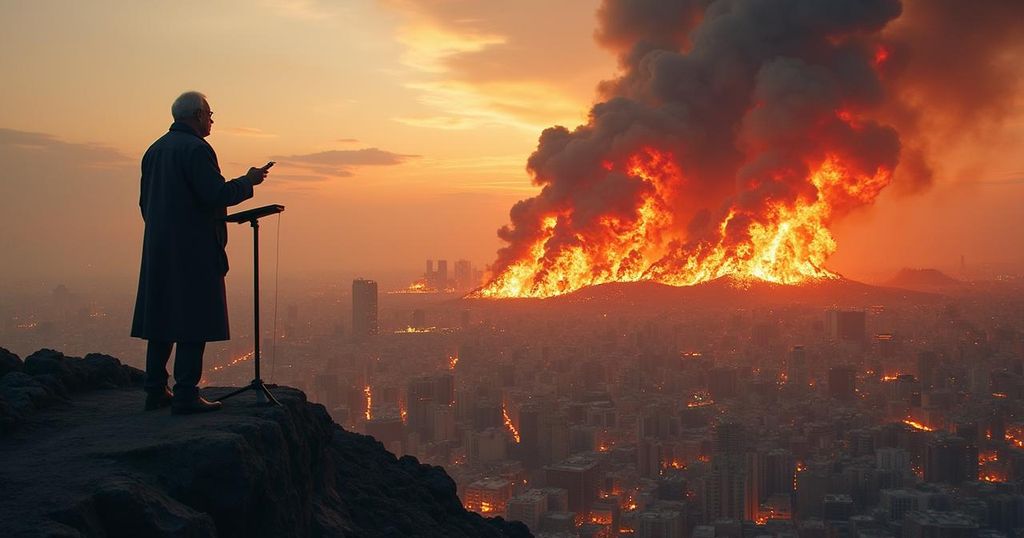UN Secretary-General António Guterres condemned the escalating violence in the Middle East, calling for an immediate ceasefire. This follows missile attacks by Iran on Israel and Israeli operations in southern Lebanon, contributing to heightened tensions with Hezbollah. The ongoing Gaza conflict impacts regional stability, alongside humanitarian crises in Yemen.
On Tuesday, with escalating violence continuing throughout the Middle East, United Nations Secretary-General António Guterres issued a stern appeal for an immediate cessation of hostilities. “I condemn the broadening of the Middle East conflict, with escalation after escalation. This must stop. We absolutely need a ceasefire,” he articulated in a concise statement. The situation further deteriorated as Iran launched a series of ballistic missiles directed at Israel, coinciding with Israel’s announcement of a limited ground operation in southern Lebanon. Reports indicate that while approximately 180 missiles were fired during this incident, the Israeli military successfully intercepted a majority, and there were no immediate reports of casualties in Israel. This latest escalation follows Israeli airstrikes targeting the southern suburbs of Beirut last week, which resulted in the death of Hassan Nasrallah, the leader of the Hezbollah armed group. In the preceding month, the region witnessed significant violence, with multiple explosions targeting Hezbollah members leading to numerous casualties. The ongoing cross-border exchanges of fire between Israeli forces and Hezbollah militants are intricately linked to the protracted Gaza conflict, which threatens to extend into a second year. Previously, hostilities between these factions ignited nearly two decades ago, leading to the UN Security Council’s adoption of Resolution 1701 in 2006. This resolution aimed to conclude the 34-day conflict by expanding the UN Interim Force in Lebanon (UNIFIL) and empowering it with more rigorous rules of engagement against these hostilities. In a separate incident, the United Nations reported that recent Israeli airstrikes against Yemeni locations, specifically Hudaydah, did not inflict significant damage on infrastructure critical to humanitarian operations. These strikes were a response to missile and drone attacks launched by Houthi rebels against Israeli cities. The Hudaydah port serves as a pivotal entry point for humanitarian aid in a region beleaguered by a decade-long conflict between government forces and the Houthis. Despite the heightened hostilities, reports from the UN indicate that both the Hudaydah and Ras Issa ports remain operational, continuing to facilitate the flow of essential supplies. As humanitarian needs escalate along Yemen’s west coast, UN Resident and Humanitarian Coordinator Julien Harneis visited the area to evaluate current conditions and response efforts, supported by the distribution of fuel for health facilities to maintain operations after the ongoing airstrikes.
The Middle East has witnessed an alarming resurgence of conflicts, particularly in the context of the Gaza war and tensions between Israeli forces and Hezbollah. The recent events, including missile attacks and retaliatory airstrikes, have intensified fears of a broader regional war. The UN’s involvement, including the deployment of peacekeeping forces under Resolution 1701, underscores the international community’s attempts to stabilize the situation and promote ceasefires. Additionally, the humanitarian crisis in Yemen exacerbated by the conflict further complicates regional dynamics, with important ports like Hudaydah serving as lifelines for aid amidst ongoing violence.
In summary, the escalating violence in the Middle East has prompted a call for urgent ceasefires from UN Secretary-General António Guterres, highlighting the cycle of retaliatory hostilities involving Iran, Israel, and Hezbollah. The developments underscore the fragile state of peace in the region, exacerbated by past conflicts and the ongoing humanitarian crisis in Yemen. The UN’s efforts to mitigate the situation reflect a broader international concern for stability and peace in a region marked by decades of conflict.
Original Source: news.un.org







